Table of Contents
Get started with MyPerfectResume today!
- Build a resume on any device
- Pick an ATS-friendly template
- Tailor with AI copy suggestions
Why this resume works
- Highlights industry-specific skills: By emphasizing skills like JavaScript, React, and cloud computing, the job seeker aligns their expertise with software engineering industry demands, showcasing readiness for complex technical roles.
- Uses action-oriented language: Action verbs like “developed,” “reduced,” and “collaborated” convey initiative and effectiveness, illustrating a results-driven approach.
- Illustrates problem-solving ability: The job seeker’s ability to reduce loading time by 40% through code optimization highlights strong problem-solving skills and dedication to improving performance.
More Software Engineer Resume Examples
Take a look at our software engineer resume examples to see how to highlight your coding, debugging, and collaboration skills. These computer software resume examples will guide you in creating a resume that showcases your technical expertise and project contributions.
Entry-Level Software Engineer
Why this resume works
- Centers on academic background: Showcasing degrees from Stanford and UC Berkeley, the job seeker highlights a strong academic foundation, emphasizing early career achievements in computer science and engineering.
- Shows digital literacy: Expertise in tools like Python, cloud computing, and CI/CD pipelines highlights computer skills, which are essential for software engineering roles.
- Effective use of keywords: Industry-specific keywords like DevOps and machine learning ensure alignment with role expectations and help the resume pass automated screenings.
Mid-Level Software Engineer
Why this resume works
- Points to measurable outcomes: By detailing accomplishments like boosting system speed by 35% and reducing server downtime, the job seeker effectively conveys their ability to deliver tangible improvements.
- Includes a mix of soft and hard skills: Combining technical expertise in Java and Python with interpersonal skills shows a well-rounded ability to tackle complex projects collaboratively.
- Demonstrates language abilities: Listing language skills in Spanish, French, and Mandarin indicates readiness for cross-cultural communication and potential international collaborations.
Experienced Software Engineer
Why this resume works
- Lists relevant certifications: The job seeker’s technical expertise and commitment to continuous learning are evident through certifications like Certified Scrum Master and AWS Certified Developer.
- Emphasizes leadership skills: By leading teams to boost product adoption by 50% and completing projects under budget, the applicant showcases impressive leadership skills in dynamic environments.
- Sections are well-organized: This resume uses headers and bullet points effectively to present information clearly and allow readers to navigate through well-organized sections.
Software Engineer Resume Template (Text Version)
Ming Davis
Seattle, WA 98106
(555)555-5555
Ming.Davis@example.com
Professional Summary
Seasoned Software Engineer with expertise in scalable apps, agile development, and cloud computing. Known for optimizing systems to improve efficiency and user experience across large teams driving project success.
Work History
Software Engineer
TechWave Solutions Inc. – Seattle, WA
January 2022 – June 2025
- Developed scalable apps used by 50k users daily
- Reduced loading time by 40% with code optimization
- Collaborated in a team of 10 engineers on projects
Web Application Developer
Digital Horizon LLC – Eastside, WA
March 2018 – December 2021
- Designed UI, improving user engagement by 30%
- Implemented security protocols reducing breaches by 25%
- Managed a cross-functional team of 12 members
Junior Programmer
EcoTech Innovations – Seattle, WA
January 2016 – February 2018
- Optimized database queries, speeding systems by 20%
- Developed scripts for data analysis, enhancing accuracy
- Assisted in the release of five major software updates
Skills
- JavaScript
- React
- Python
- Node.js
- SQL
- Agile Development
- Cloud Computing
- API Integration
Education
Master of Science Computer Science
Stanford University Stanford, CA
June 2015
Bachelor of Science Software Engineering
University of California, Berkeley Berkeley, CA
June 2014
Certifications
- Certified Software Development Professional – Institute of Electrical and Electronics Engineers
- AWS Certified Developer – Amazon Web Services
Languages
- Spanish – Beginner (A1)
- Mandarin – Beginner (A1)
- German – Intermediate (B1)
Related Resume Guides
Advice for Writing Your Software Engineer Resume
Explore our advice on how to write a resume tailored for software engineer positions. Discover how to highlight your coding skills, tech projects, and teamwork effectively. Whether you’re a seasoned professional or just starting, these tips will help you craft a resume that stands out in the tech world.
Highlight relevant technical skills
Technical skills are key for a software engineer as they enable you to build, test, and maintain software applications. To make your resume stand out, consider adding a dedicated technical skills section.
This approach allows recruiters to quickly spot the tools and technologies you’re comfortable using. You might list programming languages like Java, Python, or C++, along with frameworks such as React or Angular if you’ve worked with them.
Another option is mixing your technical skills into your work experience section. For instance, describe how you developed a web application with JavaScript or optimized database performance using SQL. This gives context to your abilities while demonstrating hands-on experience.
Highly sought-after technical skills for software engineers often include programming languages like JavaScript, Python, and Java; frameworks like React and Angular; tools such as Git and Docker; and cloud platforms like AWS or Azure. By clearly presenting these on your resume, you’ll show hiring managers that you’re prepared for the demands of a software engineering role.
Example of a technical skills section
- Programming languages (python, java, c++)
- Web development (html, css, javascript)
- Version control systems (git, svn)
- Database management (mysql, postgresql)
- Cloud services (aws, azure)
- Containerization and orchestration (docker, kubernetes)
- Agile methodologies (scrum, kanban)
- Testing frameworks (jest, junit)
- Ci/cd tools (jenkins, travis ci)
You can use our Resume Builder to easily craft a resume that showcases your teamwork, communication, adaptability, and leadership skills to stand out in the job hunt.
Quantify your accomplishments
Quantifying accomplishments in your resume makes it stand out by showing clear, measurable results instead of just listing job duties. In the work experience section, including details like your job title, employer name, location, and employment dates is essential.
To make your resume compelling as a software engineer, you should turn your responsibilities into achievements with specific metrics. For example, rather than saying you “developed software,” you could say you “increased system efficiency by 25% through developing new software solutions.”
Using action verbs and metrics creates a results-driven resume that helps hiring managers quickly see the impact you’ve made in previous roles. Statements like “reduced server downtime by 40%” or “saved $50,000 annually by optimizing code” are far more impactful than vague descriptions of daily tasks.
By highlighting achievements with percentages, time savings, or cost reductions, you provide concrete evidence of your abilities as a software engineer. This approach not only showcases what you’ve done but also how well you’ve done it, making it easier for hiring managers to assess your potential value to their team.
5 software engineer work history bullet points
- Developed and launched 10+ web applications, improving user engagement by 25%.
- Led a team of 4 engineers to deliver software projects on time, increasing team productivity by 30%.
- Implemented a new testing framework that reduced bug reports by 40%, improving overall software quality.
- Optimized database queries, reducing page load times by 50% and improving user experience.
- Collaborated with cross-functional teams to integrate APIs, resulting in a seamless data flow and a 20% increase in operational efficiency.
Need help with your resume? Check out our professional resume examples to find ideas that can make yours shine and capture the attention of recruiters and hiring managers.
Write a powerful professional summary
A professional summary on a resume introduces hiring managers to your top skills and achievements. It is typically three to four sentences long and is ideal for experienced applicants wishing to highlight their professional identity and value immediately.
A resume objective is a statement about general career goals that is more suitable for entry-level candidates, career changers, or job seekers with employment gaps. Objectives emphasize “what I aim to contribute” rather than past achievements.
We’ll provide examples of both summaries and objectives tailored to different industries and experience levels so you can choose the best fit for your resume.
Software engineer resume summary examples
Entry-level
Recent computer science graduate with a Bachelor of Science degree from a top-ranked university, specializing in software development and data analysis. Completed internships in agile environments and proficient in programming languages like Java, Python, and C++. Eager to apply academic knowledge and technical skills to contribute to innovative software solutions.
Mid-career
Software engineer with 5+ years of experience in developing scalable applications for tech startups. Expert in full-stack development using technologies such as React, Node.js, and MongoDB. Successfully led projects that improved application performance by 30% and improved user engagement through intuitive UI/UX design. Passionate about staying current with emerging technologies and improving code quality.
Experienced
Results-driven software engineering leader with over a decade of experience managing cross-functional teams in the fintech industry. Proven track record of architecting complex systems that reduced operational costs by 20%. Specialized in cloud computing, machine learning algorithms, and cybersecurity protocols. Dedicated to mentoring upcoming engineers and fostering a culture of innovation within teams.
Software engineer resume objective examples
Entry-level
Aspiring software engineer with a Bachelor of Science in computer science and hands-on experience through internships, seeking to contribute coding and problem-solving skills to a collaborative tech team. Passionate about developing innovative software solutions that improve user experiences.
Career changer
Dedicated educator transitioning into software engineering, with strong analytical skills and a background in curriculum development. Eager to leverage teaching expertise and programming knowledge gained through intensive bootcamp training to build impactful applications that drive educational technology forward.
Specialized training
Software engineer with specialized training in full-stack development seeking an opportunity to join a dynamic startup. Excited to apply comprehensive skills in JavaScript, Python, and cloud services to create scalable web applications that solve real-world problems.
Choose a resume template that’s clear and easy to read. Opt for simple fonts and bold headings, avoiding excessive graphics or elaborate designs.
Showcase your credentials
Certifications are important for a software engineer because they show your skills in specific areas and make you stand out to employers. They prove that you have learned something extra beyond your degree, which can be very helpful in technical fields.
When you list certifications, it shows that you have kept up with new technologies and trends. Creating a dedicated certifications section on your resume helps ensure these valuable credentials don’t get lost among other information. Here are a few examples of certifications you might include:
- AWS Certified Solutions Architect
- Google Professional Cloud Engineer
- Microsoft Certified: Azure Solutions Architect Expert
- Certified Kubernetes Administrator (CKA)
- CompTIA Security+
Having these certifications helps prove your knowledge in key areas like cloud computing, cybersecurity, and system administration. See a sample certifications section below.
Example of a certifications section
Certified ScrumMaster (CSM)
Issued by: Scrum Alliance
Issued 2021
AWS Certified Developer – Associate
Issued by: Amazon Web Services (AWS)
Expires 2025
Microsoft Certified: Azure Solutions Architect Expert
Issued by: Microsoft
Issued 2022
Oracle Certified Java Programmer
Issued by: Oracle
Expires 2024
Google Cloud Professional Data Engineer
Issued by: Google Cloud
Issued 2023
Follow a resume format that suits your skills and experience level to ensure your application stands out.
FAQ
Do I need to include a cover letter with my software engineer resume?
Including a cover letter with your software engineer resume can strengthen your application. A cover letter lets you showcase your passion for coding and technology and explain why you’re drawn to the specific role or company.
It’s also an opportunity to highlight key projects, like apps you’ve developed or systems you’ve improved, that might not be fully detailed on your resume.
You can use tools like our Cover Letter Generator, which provides guidance and suggestions for crafting tailored content that complements your technical skills.
Additionally, exploring our cover letter examples can offer insights into effective formats and language used by successful applicants in the tech industry.
How long should a software engineer’s resume be?
For a software engineer, a one-page resume is often enough to showcase key skills and experiences. Highlight technical skills, notable projects, programming languages you’re fluent in, and relevant certifications.
However, if you have extensive experience or niche expertise, a two-page resume might be suitable. Ensure every detail supports your story as an accomplished software engineer by emphasizing recent roles and impactful contributions.
Tailor your resume to the job description for clarity and relevance so hiring managers quickly see your value. Check out our guide on how long a resume should be for more tips suited to different career stages.
How do you write a software engineer resume with no experience?
If you have no professional experience as a software engineer, focus your resume on skills, projects, and education that show your potential in the field. Here are a few tips for writing a resume with no experience:
- Highlight education and relevant coursework: Start by listing your degree or certifications related to computer science or software engineering. Include any standout courses like algorithms, data structures, or programming languages that are particularly relevant.
- Showcase personal projects: If you’ve worked on coding projects independently or during school, list them as practical examples of your skills. Describe what you built, the technologies you used, and any challenges you overcame.
- Emphasize technical skills: List programming languages and tools you’re proficient in such as Python, JavaScript, C++, Git, etc. If you’ve contributed to open-source projects or participated in hackathons, include those details.
- Include internships or volunteer work: Even if they aren’t directly software engineering roles, any tech-related positions can demonstrate valuable skills. Highlight tasks involving problem-solving or coding.
Consider tailoring your resume for specific job descriptions by identifying keywords and matching them with your skills and experiences.
Rate this article
Software Engineer
Share this page
Additional Resources
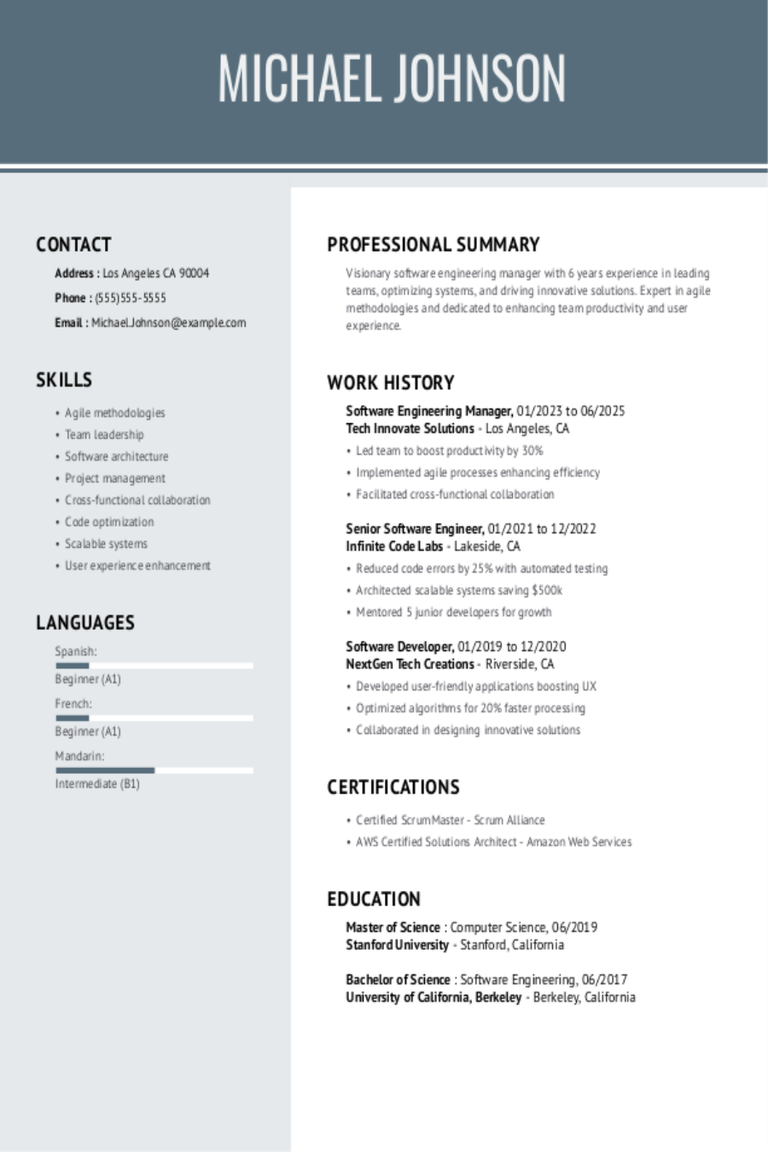
Software Engineering Manager Resume Examples & Templates
Explore software engineering manager resume examples and tips to learn how to emphasize your leadership, project management, and coding skills.Build my resumeImport existing resumeCustomize this templateWhy this resume worksQuantifies accomplishments: Measurable

Engineering CV Examples & Templates
Engineers play many roles in designing, building and improving infrastructures, technologies, medical equipment and more. Employment in this occupation is expected to grow 4% over the next decade, bringing in
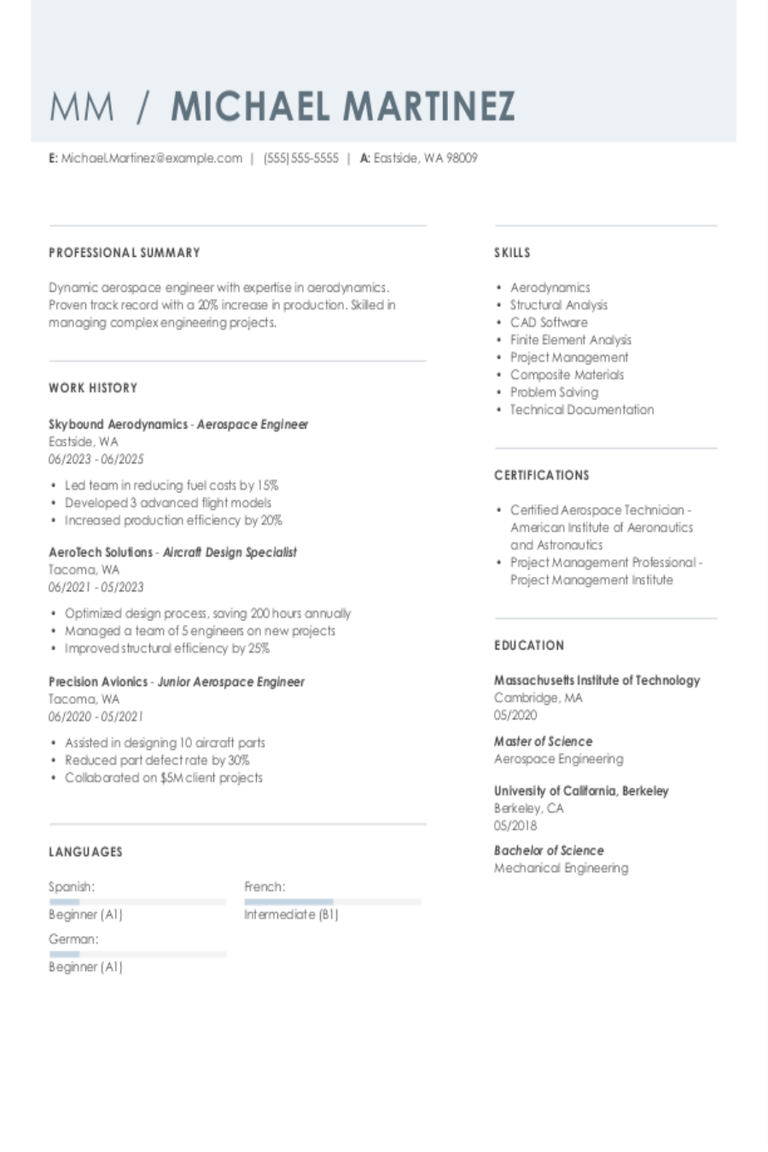
Aerospace Engineer Resume Examples & Templates
Explore aerospace engineer resume examples that show you how to highlight your experience designing aircraft, testing systems, and solving technical problems.Build my resumeImport existing resumeCustomize this templateWhy this resume
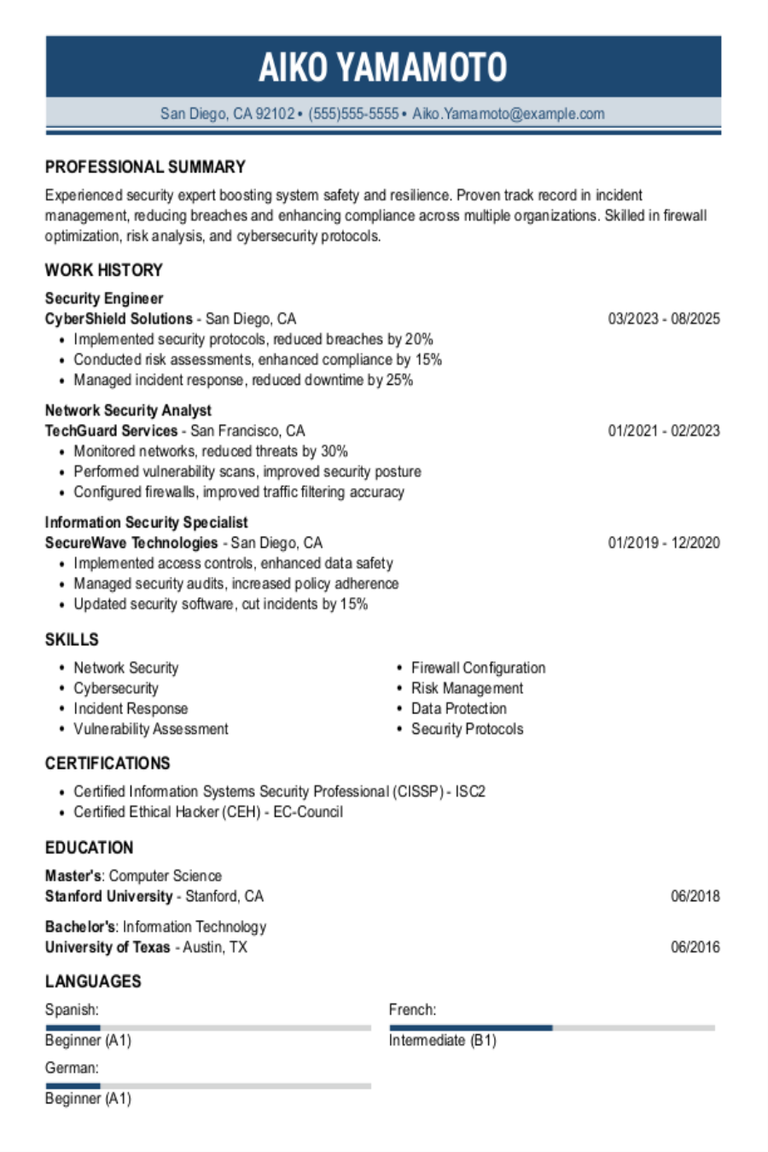
Security Engineer Resume Examples & Templates
Explore security engineer resume samples that highlight tech skills and experience in protecting data. Get tips to showcase your problem-solving abilities and cybersecurity expertise.Build my resumeImport existing resumeCustomize this templateWhy
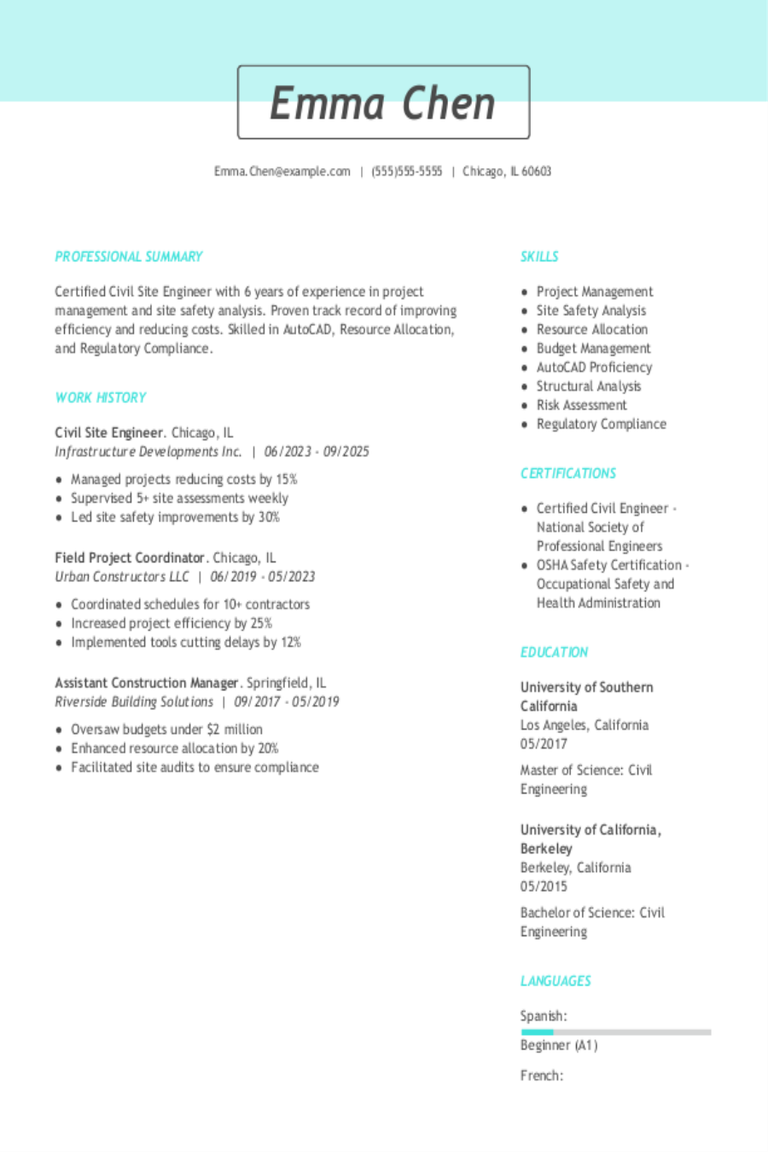
Civil Site Engineer Resume Examples & Templates
Browse civil site engineer resume examples to see how to highlight your experience planning projects, overseeing construction, and ensuring safety on site. These examples and tips help you highlight your
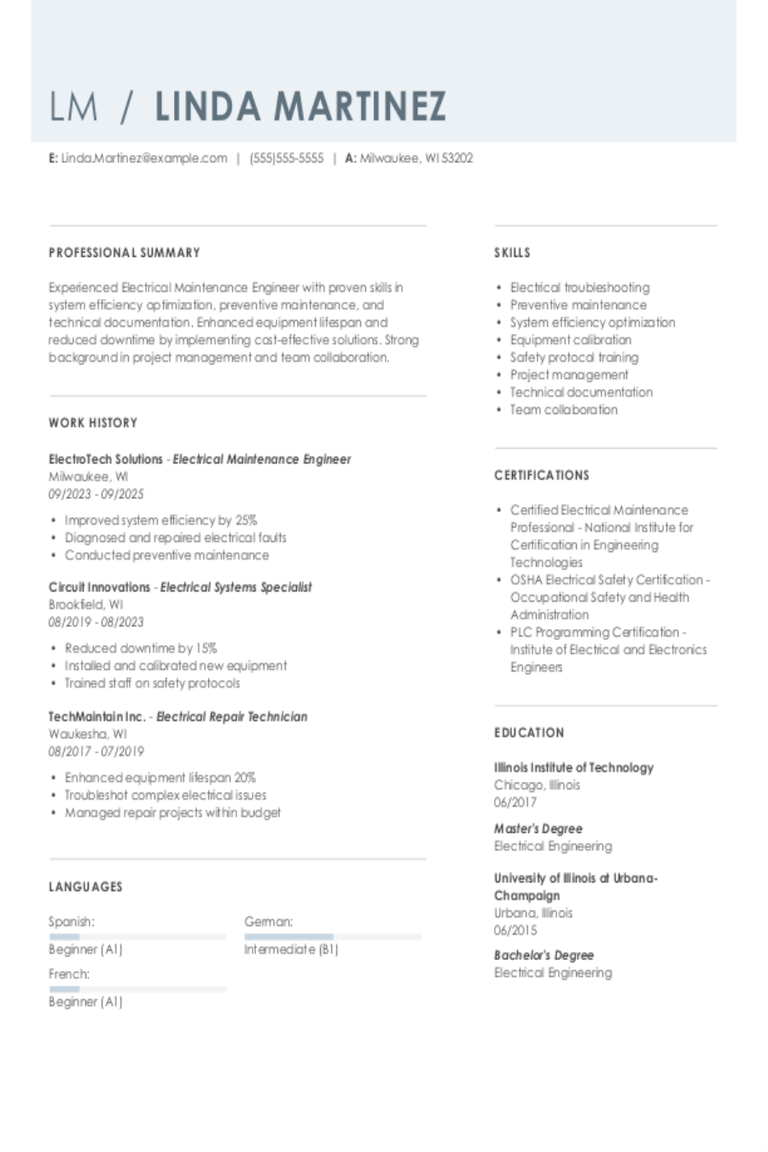
Electrical Maintenance Engineer Resume Examples & Templates
Explore electrical maintenance engineer examples and tips to learn how to effectively showcase your hands-on experience, teamwork, and problem-solving expertise.Build my resumeImport existing resumeCustomize this templateWhy this resume worksQuantifies accomplishments: By
